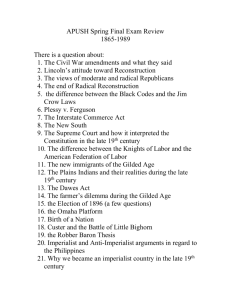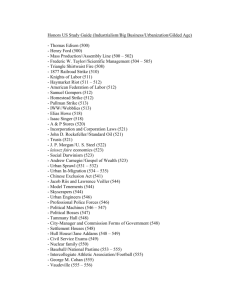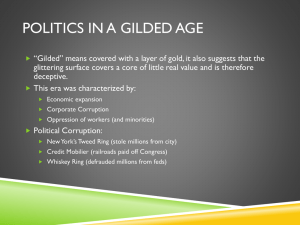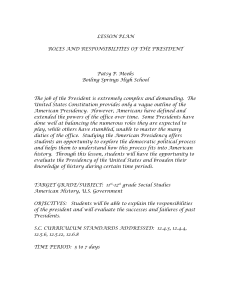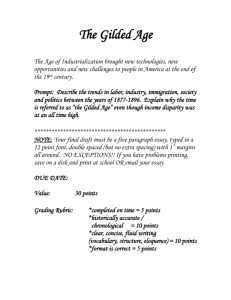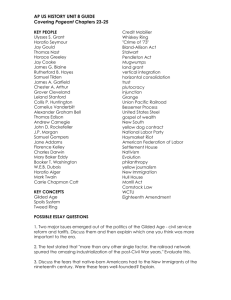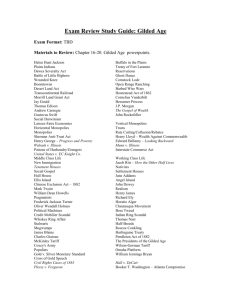United States Presidents 1869-2012 Ulysses S. Grant 1869
advertisement
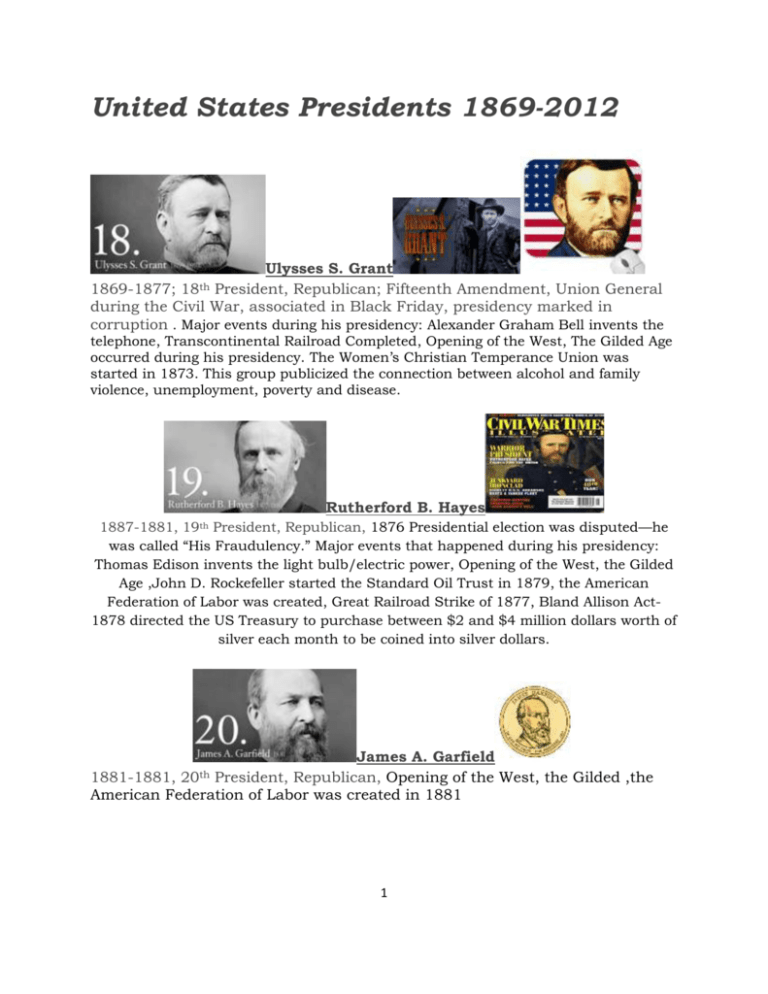
United States Presidents 1869-2012 Ulysses S. Grant 1869-1877; President, Republican; Fifteenth Amendment, Union General during the Civil War, associated in Black Friday, presidency marked in corruption . Major events during his presidency: Alexander Graham Bell invents the 18th telephone, Transcontinental Railroad Completed, Opening of the West, The Gilded Age occurred during his presidency. The Women’s Christian Temperance Union was started in 1873. This group publicized the connection between alcohol and family violence, unemployment, poverty and disease. Rutherford B. Hayes 19th 1887-1881, President, Republican, 1876 Presidential election was disputed—he was called “His Fraudulency.” Major events that happened during his presidency: Thomas Edison invents the light bulb/electric power, Opening of the West, the Gilded Age ,John D. Rockefeller started the Standard Oil Trust in 1879, the American Federation of Labor was created, Great Railroad Strike of 1877, Bland Allison Act1878 directed the US Treasury to purchase between $2 and $4 million dollars worth of silver each month to be coined into silver dollars. James A. Garfield 1881-1881, 20th President, Republican, Opening of the West, the Gilded ,the American Federation of Labor was created in 1881 1 Chester Arthur 1881-1885, President, Republican, Opening of the West, the Gilded Age , Chinese Exclusion Act of 1882 was passed. The entry of Chinese laborers into the United States was prohibited for 10 years. By 1886, the Knights of Labor had over 700,000 members. The Immigration Act of 1882 was passed during his presidency. This prohibited the immigration of criminals, paupers, the insane or others likely to become public concern. Pendleton Act of 1883 was passed. This created the Civil Service Commission with three members appointed by the President. This started the use of competitive exams to determine the merit of individuals applying for government jobs. 21st Grover Cleveland 1893-1897, and 24th President, Democrat, American Federation of Labor & Knights of Labor gained power. Opening of the West,the Gilded Age, Haymarket Riot 1886-AFL and Knights of Labor went on strike. A bomb was thrown into the crowd, several were killed and many wounded. The strike was for an 8-hour work-day. Cleveland was committed to improving the economy. Populist Party was a third party that arose during his presidency. Their issues were: 1) supported free and unlimited coinage of silver, 2) supported government ownership of railroads and telegraph lines, 3) graduated income tax, 4) direct election of senators, and 5) referendum, initiative and recall methods. Presidential Act of 1886-established the succession of the presidency if death or resignation occurred. The succession line fell on the executive departments. Interstate Commerce Act of 1887 was passed. This established a 5 person agency: The Interstate Commerce Commission which required railroads to publish their rates and to be reasonable and just. A new presidential cabinet position was added in 1887: Secretary of Agriculture. Sherman Anti-trust Act of 1890 was passed. This prohibited monopolies. It declared any business combination that restrained trade illegal. (corporations) This was not enforced by the courts. Panic of 1893: was an economic depression that included agricultural depression, decline in the U.S. Gold Reserve, and unsound railroad financing practices. A railroad in Philadelphia declared bankruptcy and the gold reserve dropped. Effects of this depression: banks closed, railroad strikes, unemployment, and violence. 20% of the labor 22nd 2 force was out of work (average is 4 to 5% unemployment). This was the highest unemployment rates in American history at the time. Coxey’s Army 1893: A populist businessman, Jacob Coxey, of Ohio advocated a works program that would put the unemployed to work. Congress did not act on this program and an army of 500 unemployed workers went to Washington D.C. demanding $500 million in fiat money to provide jobs for the unemployed. The army was surrounded by police, Coxey was arrested and the protest failed. Anti-Saloon League was founded in 1893. This group pushed for a constitutional Amendment that would prohibit the production and consumption of alcohol. In 1887 an agreement was renewed to make Pearl Harbor a naval base for the United States. 2nd Term: Pullman Strike 1894, the Gilded Age, Munn v. Illinois, Pullman Strike—1894-Pullman Palace Car Company cut wages 25% and the workers went on strike. Plessy v. Ferguson 1896- separate but equal facilities was constitutional, Coxey’s Army 1894. Benjamin Harrison 1889-1893, 23rd President, Republican. Grandson of President William Henry Harrison McKinley Tariff Act 1890, Sherman Silver Purchase Act 1890, Disability Pension Act 1890, Admission of 6 states 1889-1890, Pan-American Conference 1890, The National and Women’s Suffrage Association (NAWSA) was formed. This agency fought for the right for women to vote. William McKinley 1897-1901, President, Republican, The Gilded Age occurred during his presidency. He defeated William Jennings Bryan, democrat, in the election of 1896. The democrats and the populist received 47.7% of the votes. Spanish American War occurred during his presidency. “Splendid Little War of 1898”. Spain v. United States, U.S. Maine, yellow journalism. Events that led to the Spanish American War: de Lome letter, sinking of the Maine and yellow journalism. Effects of the war: Teller Amendment (made Cuba a protectorate of the United States), Guantanamo Base was established as a USA naval base in Cuba, Foraker Act 0f 1900 and Jones Act of 1917 made Puerto Rico an 25th 3 unincorporated territory of the United States, Roosevelt Corollary was started (made USA the international police), Hay-Bunau Varilla Treaty: Panama leased the Panama Canal to USA, and the united States acquired Guam as a colony. His presidency brought about tariff increases, the gold standard and economic betterment. He raised tariffs to 57%, the highest ever. The Gold Standard of 1900: The gold dollar of 25.8 grams became the standard unit of value. The gold reserve was established at $150,000,000 for redemption in paper currency. He was shot by Leon Czolgosz, an anarchists on September 6, 1901. He died and Theodore Roosevelt became President. He was shot in Buffalo, New York, while at a Pan-American Exposition. Populist Party started to fade. 4
